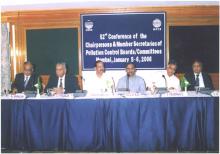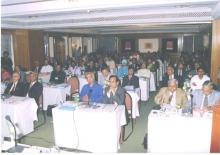Section Title
Main Content Link52nd Conference of Chairpersons and Member Secretaries of Central and State Pollution Control Boards or Committees
Central Pollution Control Board regularly holds Conference of Chairmen and Member Secretaries of Pollution Control Boards so as to discuss common issues related to prevention and control of pollution and to evolve strategies for pollution control enforcement. Since promulgation of the Water (P&CP) Act, 1974, 51 such Conferences were held by CPCB across the country. 52nd Conference was held at hotel ‘The Retreat’, Madh Island, Mumbai on January 5 and 6, 2006. Maharashtra Pollution Control Board hosted the Conference. Participants were from 28 States, 6 Union Territories, Central Pollution Control Board and Union Ministry for Environment and Forests (MoEF), New Delhi. The Conference was addressed by Shri A. Raja, Union Minister for Environment and Forests and Shri Ganesh Naik, Maharashtra State Environment Minister. On the first day of Conference various environmental issues were discussed. Major issues include review of environmental data bank activities, air quality monitoring, water quality monitoring, common treatment facilities, strategies for hazardous waste management, funding for new projects, strengthening of pollution control boards and committees, e-waste management, plastic waste management ( ban on plastic carry bags) and introduction of environmental educational courses. Air quality status, status of continuous air quality monitoring stations in 16 cities, air pollution source apportionment studies, etc were discussed in air quality status. MPCB is installing 3 continuous monitoring stations with the financial support of CPCB at Mumbai, Pune and Solapur. CPCB has initiated source apportionment studies in two cities namely; Pune and Mumbai. MPCB is already making air and water quality data available on MPCB website on a regular basis for public information. Status of common effluent treatment plants (CETPs), sewage treatment plants was reviewed. Status of common bio-medical waste treatment facilities (CMBWTFs), common hazardous waste treatment storage and disposal facilities (CHWTSDF), review of implementation of action plan critically polluted areas, proposed strategy for hazardous waste management with respect to interstate movement and common hazardous waste treatment, storage & disposal facilities (CHWTSDF) was discussed for each state. Need to set – up environment protection / improvement bank / environment Finance Corporation for funding the projects / schemes was identified and discussed. Maharashtra has 2 common hazardous waste treatment and disposal facilities at Taloja and TTC. Further there are 24 common biomedical waste treatment and disposal facilities in the state. MoEF also appreciated the initiatives by MPCB for improving the performance of CETPs.CPCB appreciated the progress of Maharashtra and Gujarat State for implementation of Hazardous Waste (Management and Handling) Rules,2003 and Hon’ble Supreme Court Order dated 14.10.03. The functions of the state boards are increasing with newer legislations. The structure of the Board is presently based on the Water Act, 1974. It is therefore necessary that the Board should be developed and strengthened as a scientific and technical organization. The conference also noted a study conducted by MPCB on the capacity building of the Board through CRISIL. MPCB study envisaged a paradigm shift in the policy and approach of the Board in pollution control from command and control to information based and market based initiatives, . On January 6, 2006, the Chairman and Members of the Supreme Court Monitoring Committee (appointed in the matter of CWP No. 657 of 1995 regarding Hazardous Wastes Management) meeting was held for consultation with the State Pollution Control Boards. Dr. G. Thyagarajan, Chairman of the committee addressed the overview of environmental monitoring by the SCMC. He mentioned about the commendable steps taken by Maharashtra Pollution Control Board and Gujarat Pollution Control Board for implementation of Hazardous Waste Management and Control in their State. He placed the states in three categories as States in compliance, States not in compliance but who have committed to comply within already specified final time frames and States not in compliance. As stated by the Chairman, Maharashtra and Gujarat are the only two states which are “States of Compliance†in whole of a country. Maharashtra Pollution Control Board has launched software on website to quantify the hazardous waste in different regions and verify the quantity of waste in the state. MPCB demonstrated the application of software to SCMC. This software will be further used to track Hazardous Waste in the state. MPCB has also prepared a detailed inventory of Hazardous waste generation of the state which is also available on MPCB website.

